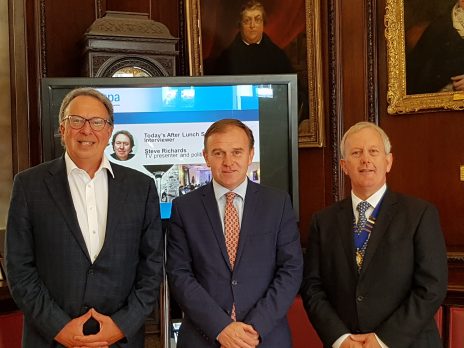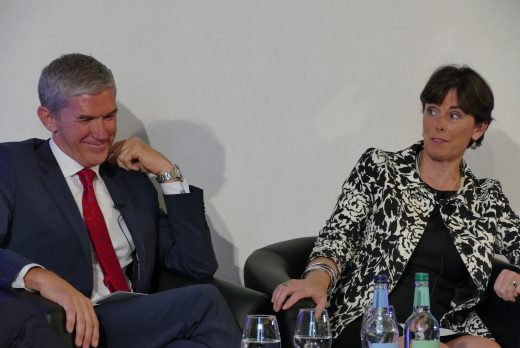BMPA Conference reviews Brexit position and industry outlook
Stationers’ Hall in London was the setting for this year’s annual British Meat Processors Association AGM and conference (BMPA). The AGM which was attended by members only, made way for conference and lunch, with special guests at the conference George Eustice MP, Minister of State for Agriculture, and from the Food Standards Agency (FSA) Heather Hancock the chair of the board and CEO Jason Feeney.

Left to right: Journalist Steve Richards, minister of State for Agriculture George Eustice and BMPA president Isla Roebuck.
Opening proceedings, Nick Allen CEO of the BMPA said it had been a tough year for the meat industry and a tough year for BMPA as a result.
Following on from Nick Allen, current president of the BMPA Isla Roebuck welcomed delegates as well as various special guests from the wider industry, before highlighting concerns about Brexit and the need to obtain more information which is needed by industry to plan forward. He said: “The BMPA is committed to high standards with good reliable supply of product at a competitive price. One concern post Brexit is the potential of imports flooding the market with cheap quality which will undermine the market, affect price stability and food security.”
Mr Roebuck sited beef production as an example, reminding delegates that the time frame for change can often be three to five years in relation to appropriate investment. He added that it is vital Defra backs the industry and that livestock remains critical to our countryside, so long term sustainability remains essential, as is ensuring that ongoing production measures for farming and processors complement each other.
He added: “BMPA will work with policymakers. There is too much unfounded anti-meat propaganda being left unchallenged and we need evidence based information to combat this. We continue to work with the Food Standards Agency (FSA) but the last year has been challenging and with Brexit on the horizon the next year is likely to be more so.”
Political journalist Steve Richards was enlisted to interview the minister George Eustice MP in a question and answer session, which concluded with questions from the floor. He opened the conversation by suggesting to the minister that there remained a lack of clarity surrounding Brexit and would he clarify the timetable. In response, the minister said the vote to leave the EU was a big decision and that we can’t always guarantee certainty on these things adding: “We want a transition deal through to 2020 and therefore this means nothing will change until 2021. By the autumn this year the agreement reached with the EU will be put to Parliament – around October or November. We want agreement on the customs union and trade.”

FSA’s Jason Feeney and Heather Hancock.
He stressed that it’s “up to us to set the terms of access” to our market. The MP sought to re-assure the delegates gathered at Stationers’ Hall that this would be helped by “refocusing the subsidy regime to support animal welfare” in the new agricultural policy currently being debated. Government, he added, could also “loosen the reigns on TF3 and TF5 visas” post Brexit, to ease labour shortages and further support the industry. “We shall not be pulling up the drawbridge. We will be ending free movement of labour, but there are other options including setting quotas.”
Responding to further questions, the minister said he felt it was unlikely we would repeal EU rules and that we would seek to bring across EU regulation. He also added that there was no question of the UK reducing standards and that we won’t be ‘spooked’ by other countries outside the EU to reduce standards on imports or on trade. He added: “We are an open country for trade and have a long history in that regard. But critically we won’t reduce standards.”
Responding to a suggestion that the need for speedy agreements with third countries may have the effect of putting pressure on maintaining standards, the minister added: “These countries want access to our market, but access will be on our terms which is very normal when it comes to trade negotiations of this sort.”
Talking about the Irish Border issue, Mr Eustice could provide less re-assurance. He was challenged by Andrew Kuyk from the PTF, who pointed out that this is a ‘Catch 22’ situation. Government must be able to explain what the border agreement looks like before Parliament can vote on the withdrawal. The minister explained that if we don’t get an agreement, it would then be open to the UK to “unilaterally adopt a risk-based border approach” (the so-called ‘Max-Fac’ solution) but, he added, “there is no guarantee that the EU would reciprocate.”
Another unresolved issue is that of our trade deals with 3rd party countries. Once we leave, it’s not clear if these agreements will continue to be honoured as the deals were set up with the UK as a member of the EU. Mr Eustice suggested that, once we leave, we would have to bi-laterally re-agree all those 3rd party agreements as they roll-over.
The FSA was up next with both Heather Hancock and Jason Feeney taking the stage, interviewed by Julia Glotz. Discussing the past and present relationship the FSA have with the meat industry, Heather Hancock said that FSA had made good progress in changing the relationship with the sector and whilst FSA can and will retain its independence, it seeks to work collectively with the industry: “That’ a priority for me,” she added.
“I recognise that the past relationship was perhaps at best tense but I know we share the same objectives as the meat industry when it comes to safety, consumer confidence and good communication.”
Jason Feeney the CEO of the FSA said: “We have listened to views and have discussed many issues. It is a broad church and the different problems we saw with Russell Hume and 2 Sisters is a good example of this.”
He also confirmed that the National Food Crime Unit is being expanded and will increase from its current 20 people to around 70 or 80 people, which he believes outlined the FSA’s commitment to maintaining standards and reassuring trading partners and consumers. Following questions from the floor, the FSA chiefs gave emphatic assurance that anyone coming forward with a complaint to their National Food Crime Unit would be given complete anonymity and confidentiality.
One high ranking delegate, approached by Meat Management, said: “It’s been a really good day and its always useful to get out of the office to meet colleagues and discuss common problems and opportunities. It was also good to see the minister here and that reflects the standing of BMPA in the political arena. However, I am not sure he actually said very much. It was a typical politician’s performance with much style over substance.”
The conference concluded with lunch and drinks which was a welcome networking opportunity and a brief speech from political journalist Steve Richards was much enjoyed summing up the day with an amusing and insightful review.

 Ginsters rebrands its packaging and promotion
Ginsters rebrands its packaging and promotion AHDB sees increase in pork sales following campaign
AHDB sees increase in pork sales following campaign
